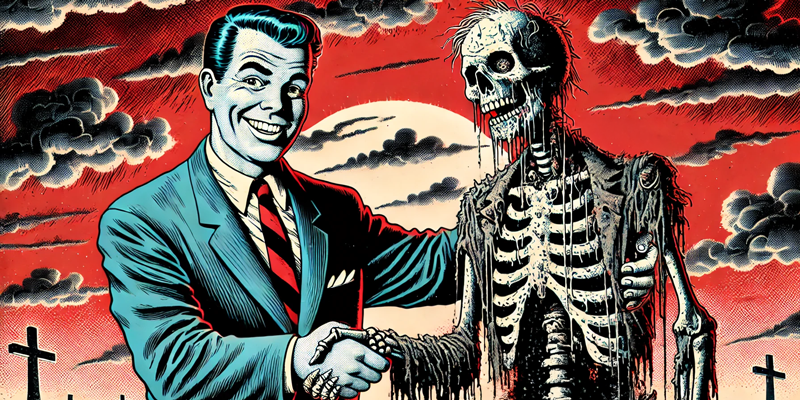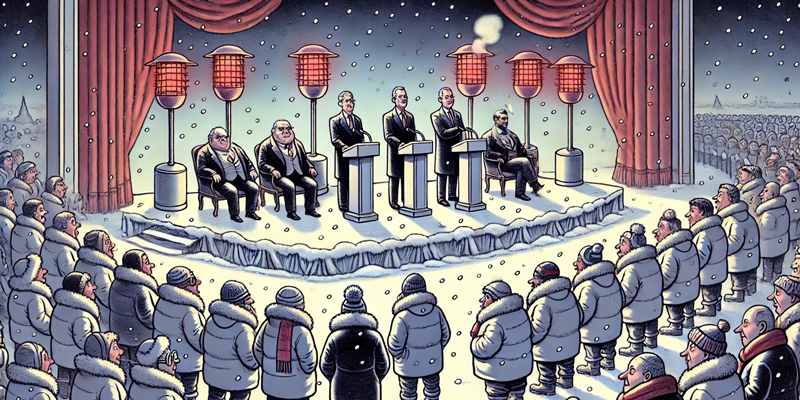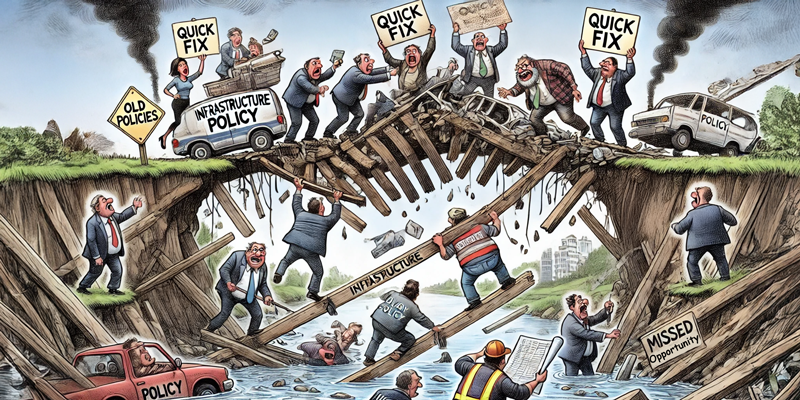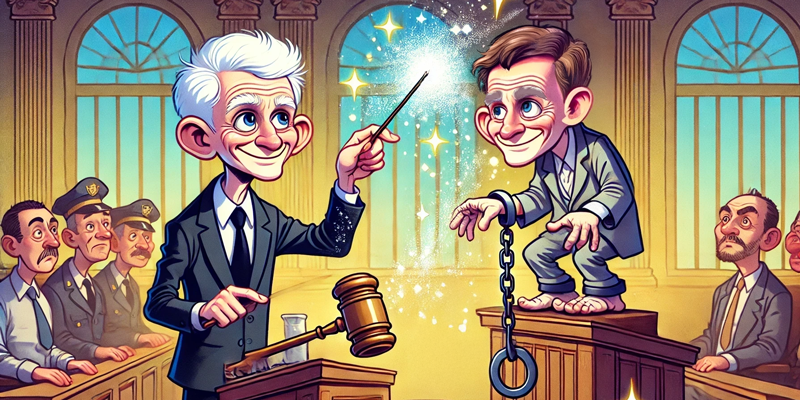On WNRI 1380 AM/95.1 FM, John DePetro and Justin Katz discuss:
- RI politicians promote crisis for homelessness
- RI congress-critters excuse complacency for illegal immigrant crime
- Shekarchi’s mysterious intentions
- The state’s unusual cooperation with immigration officials
- The expected corruption in North Providence
- California distraction theater as a less for RI
Featured image by Justin Katz using Dall-E 40 and Photoshop AI.
[Open full post]On WNRI 1380 AM/95.1 FM, John DePetro and Justin Katz discuss:
- City hall as a homeless shelter
- A budget of nips and tucks
- Congressional Democrats’ tolerance for foreign predators
- Whitehouse’s loser attacks on SCOTUS
- Smiley’s wanting the schools back
- Ruggerio fails to vote for himself
- RIPBS’s big bucks, big pay, and small audience
Featured image by Justin Katz using Dall-E 40 and Photoshop AI.
[Open full post]On WNRI 1380 AM/95.1 FM, John DePetro and Justin Katz discuss:
- ’24 in review
- A hopeless list of people to watch in ’25
- Foulkes’s chances as an independent
- Bad-taste state-of-the-state promotions
- Non-revolutionary “revolutionary” journalists
- Relying on governments that can’t run websites
Featured image by Justin Katz using Grok and Photoshop AI.
[Open full post]On WNRI 1380 AM/95.1 FM, John DePetro and Justin Katz discuss:
- Shekarchi marvels at the missing lobbyists
- Everybody else’s lack of accountability
- ILO as the nouveau corrupt
- Teamsters get out the inflatables for Amazon
- Unsurprising warnings about cybersecurity
- What Musk does differently (and what RI needs)
Featured image by Justin Katz using Grok and Photoshop AI.
[Open full post]On WNRI 1380 AM/95.1 FM, John DePetro and Justin Katz discuss:
- RIBridges to disaster
- The Washington Bridge PR dance
- Pallet shelter message for would-be innovators
- McKee and Neronha’s peacock fight
- A contrasting immigration approach in Virginia
- Tolls are only about more money!
Featured image by Justin Katz using Dall-E 40 and Photoshop AI.
[Open full post]They’re ba-a-a-a-a-ack.
Well, strong possibility.
Truck-only tolls, that is.
To clarify, Rhode Island’s only-in-the-nation, truck-only toll law is not just discriminatory – it applies only to a certain type of vehicle, trucks – but it is actually doubly discriminatory – it applies only to CERTAIN trucks (Class 8 and above).
But the federal appeals court ruled on December 6 that they are NOT discriminatory. No siree Bob. So they purportedly pass Constitutional muster, though the toll caps do not.
The ruling came as a surprise to anyone with more than two functioning brain cells.
But here we are, at least for now. And with the toll caps taken away, also.
So now Rhode Island, and actually many other states with poorly managed infrastructure budgets, are hanging fire to see if the American Trucking Associations files an appeal with the United States Supreme Court.
In the meantime, Governor McKee and the General Assembly plan to take up legislation to potentially “re-legalize” truck tolls in the upcoming session, though the Providence Journal is reporting (paywall; sorry) that it will not get rushed through.
Alrighty. Now, for those harboring the illusion that ever more revenue – whether truck tolls or all-vehicle tolling – is the answer to Rhode Island’s infrastructure woes, let’s lay out the cold, hard, bumpy facts.
Before truck tolls, Rhode Island had the sixth highest per lane mile spending on state-owned roads. Sixth highest per mile spending for – all together now – “some of the worst roads and bridges in the country”.
Seven years, $100,000,000+ in toll revenue and many millions in 2021 Infrastructure Investment and Jobs Act dollars later – yowzah, Rhode Island now has the highest “Capital Outlay” per lane mile.
What has all of this spending gotten us?
Well, as of May of this year, Rhode Island ranked 47th for bridge quality, per (sorry!) the Providence Journal.
Aaaand, as of July, Rhode Island has “The worst roads in America”, according to “Consumer Affairs”.
How about another measure, one that is more “flattering” of Rhode Island’s infrastructure progress? Sure! Reason Foundation’s Annual Highway Reports. Its 2016 report ranked Rhode Island at 47th for overall “Highway Performance”.
In its 2023 report, Rhode Island had risen up five spots to 42 overall, though (sigh) 48th for structurally deficient bridge
In sum, ever more revenue has led to either zero or, at best, slow-as-molasses progress on the state’s highways.
And NO progress on the state’s bridges, which was the excus … er, stated reason for the necessity of truck tolls.
There’s no substitute for proper management of infrastructure resources. Accordingly, don’t bother with tolls, or any new infrastructure revenue for that matter, honorable leaders and legislators. Lack of it ain’t the problem and more of it won’t get the job done.
[Featured image by DEX Studios via Youtube.]
~
Monique has been a contributor to Anchor Rising for over ten years, was volunteer spokesperson for the citizens advocacy anti-toll group StopTollsRI.com for three+ years and began working for the Rhode Island Trucking Association as a staff member in September of 2017.
[Open full post]On WNRI 1380 AM/95.1 FM, John DePetro and Justin Katz discuss:
- What the latest truck-toll verdict means for Rhode Island
- One year into the Washington Bridge mess
- McKee’s private tree lighting
- An RI Congressman who doesn’t live in his district worries about public policy in Florida
- What the pallet shelter debacle says about RI government’s competence
- Progressives sympathize with an assassin
Featured image by Justin Katz using Dall-E 40 and Photoshop AI.
[Open full post]This is not the biggest question pertaining to Rhode Island’s handling of the failed Washington Bridge – it is secondary, for example, to WHY the state had to offer a serious incentive for what would seem to be a juicy public contract, not to mention what Ken Block is in the process of turning up – but still an important one.
Credit right up front: this article was spurred by a comment on Twitter (sorry, won’t call it X) by @startchangeri.
As you probably know, RIDOT and Governor McKee got no bids on the first RFP to design and build the westbound Washington Bridge. RIDOT then issued an RFI and an RFQ as groundwork for issuing a second RFP. Further to that,
In an effort to get more companies to submit bids, RIDOT said it would offer “an increased $1.75 million stipend” to the unsuccessful shortlisted company to help cover the costs associated with crafting their technical and cost proposal.
Inasmuch as any company qualified to bid would not know if it was going to be the losing finalist … or, put it another way, would know that it could well be the losing finalist, this approach is almost an enticement by raffle to bid — a raffle with a generous prize and a favorably low number of participants at that.
Commenter @startchangeri on Twitter alertly pointed to Rhode Island purchasing regulation #220-RICR-30-00-13 which states (emphasis added)
All costs associated with the preparation, development and submission of bids or proposals and/or protests arising therefrom, in response to solicitations issued on behalf of the State, shall be the Vendor’s sole responsibility. The State will not reimburse any Vendor for such costs.
and wondered if there was some sort of legal waiver in this case.
Anchor Rising inquired of Governor Dan McKee’s administration about the prohibition on reimbursement for such bidding costs. The Department of Administration pointed to another purchasing reg, 220-RICR-30-00-13.33, which states
The State Purchasing Agent reserves the right to agree to alternate terms and conditions for a specific purchase in order to serve the best interests of the State and/or protect the health, safety or welfare, economic or otherwise, of the State and its citizens.
So in Rhode Island, it is illegal to reimburse any Vendor for bidding costs … unless it is deemed not to be illegal, conferring on such a raffle … er, reimbursement, an almost quantum, or Schrodinger’s Cat, state of legality.
Meanwhile, those interested in learning more about the Why and How of the state’s serious failure to keep and maintain the westbound Washington Bridge should drop in on Ken Block’s Twitter feed throughout this coming week.
[Open full post]On WNRI 1380 AM/95.1 FM, John DePetro and Justin Katz discuss:
- The pardon everyone expected
- The bomb threats nobody should take at face value
- The Congressman nobody should take seriously
- The sanctuary policy progressive cities and states should reconsider
- The no-lose process of infrastructure bidding
- The Thanksgiving story journalists don’t want to tell
- The social media platform Democrats want to shun
- The partisans journalists find suspicious
Featured image by Justin Katz using Dall-E 40 and Photoshop AI.
[Open full post]On WNRI 1380 AM/95.1 FM, John DePetro and Justin Katz discuss:
- What’s RI missing for Hasbro?
- What keeps RI’s roads so bad?
- What do progressives know about reality?
- What are journalists hoping to avoid on progressive social media?
- How can urban homelessness be addressed?
- What hope does RI government have under Trump?
Featured image by Justin Katz using Dall-E 40.
[Open full post]










